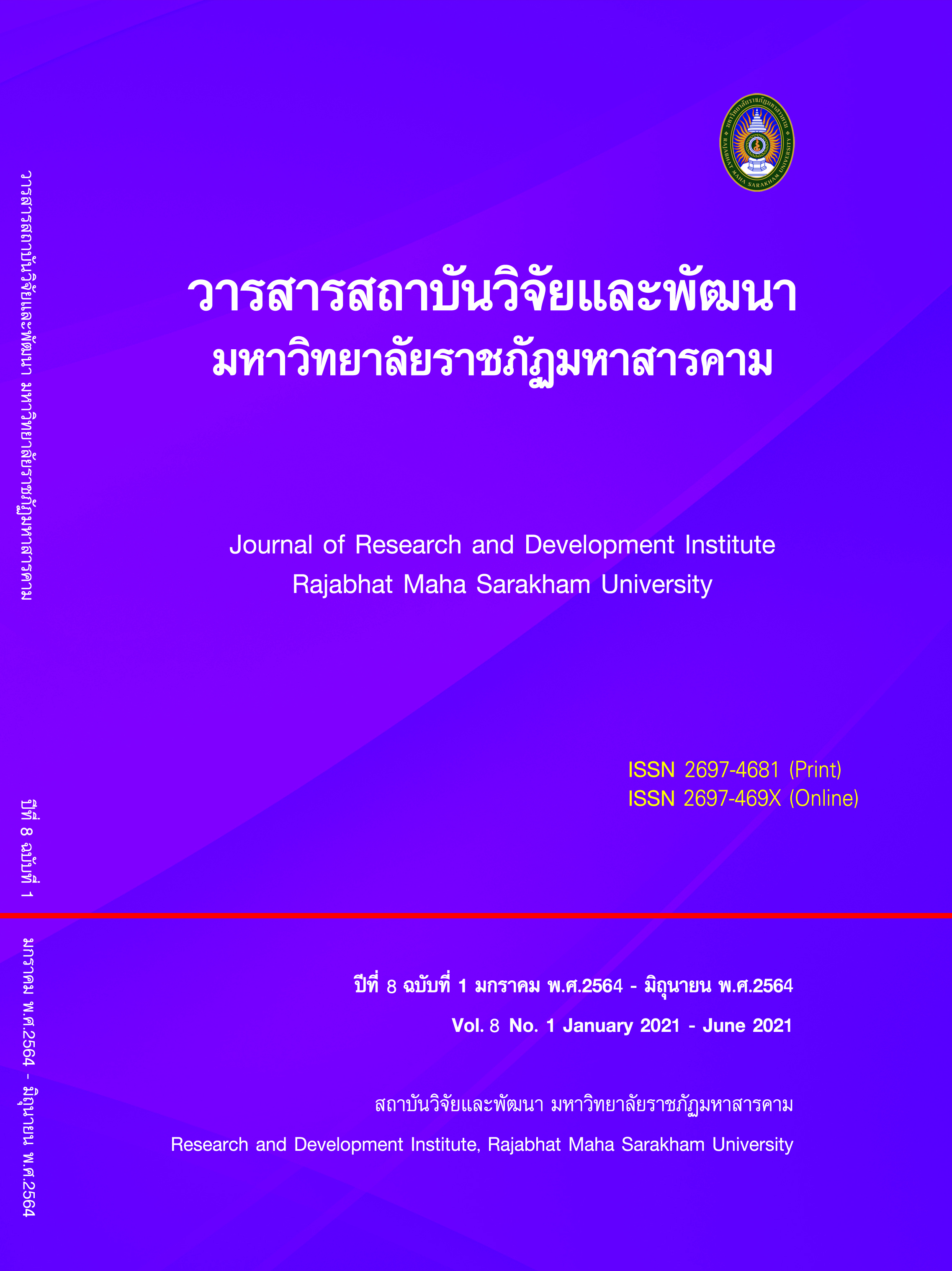Behavioral Development of Community Leaders’ Everyday-Life based on the Sufficiency Economy Philosophy in Mahasarakham
Keywords:
Behavioral of Everyday-Life, Philosophy of Economic self- Sufficiency, Community LeaderAbstract
Abstract
The objectives of this research were: (1) to determine the level of understanding and knowledge on the sufficiency economy philosophy amongst community leaders (2) to determine the behavior of living based on the philosophy practiced amongst the community leaders and (3) to determine the factors which influenced these behaviors amongst the community leaders. The study was conducted in 3 villages in Maha Sarakham province: Ban Nong Phueak (Wapi Pathum District); Ban Lao Noi (Muang District); and Ban Huai Sai (Borabue District). The respondents were 120 community leaders. The tools used for data collection were questionnaire. The statistical analyses used were descriptive statistics, multiple regression analysis (MRA).
The findings showed that the average score on the level of understanding and knowledge regarding the sufficiency economy philosophy amongst community leaders was 8.35. Most of them had adequate knowledge and understanding about the philosophy for their position of high level community leaders. The level of living behavior based on the sufficiency economy philosophy of the respondents, as a whole, was at a very good level (= 4.58). When considered individual aspect, the best behavior types were: behavior based on moral conditions (= 4.66) behavior based on knowledge conditions (= 4.65) behavior with good immunity (= 4.58) behavior with moderation (= 4.52) behavior with good reasoning (= 4.46). Overall, the respondents achieved very good ratings on all 25 questions in the questionnaires and it was found that factors which influenced these behaviors were the knowledge gained from the training on the sufficiency economy philosophy. This factor can be used to explain the variation in their behavior amongst the community leaders with R2 = 0.311 and F = 39.679 in multiple regression analysis.
References
Chantarasorn, W., Somrang, A., Jitsa-nguan, T. and Pitakthepsombat, P. (2008). The research study to expand public results on the development of water resources, soil, forests and agriculture according to the Sufficiency Economy Philosophy. Bangkok: National Council of Economic and Social Advisory.
Kenaphoom, S. (2014). The Relationship between sufficiency economy philosophy and democratic way of community in Khok Phra Subdistrict, Makha Subdistrict and Kut Sai Cho Subdistrict Kantharawichai District Maha Sarakham Province. Maha Sarakham: Maha Sarakham Rajabhat University.
Leklersin, S. (2017). Knowledge, understanding and application of sufficiency economy philosophy in community economic development, Bang Yai Subdistrict, Bang Yai District, Nonthaburi Province. Journal of Humanities and Social Sciences Thonburi University. Vol. 11 No. 25 (88).
Phibunsarawut, P. (2006). Sufficiency Economy and its Applications in Education.
Bangkok: Sufficiency Economy Research Project, Crown Property Bureau.
Research Fund Office. (2006). Sufficiency economy to expand. Bangkok: Amarin Printing and Publishing.
Senanarong, A. (2007). Propose projects and activities in honor of His Majesty the King. Minutes of the Seminar on the Auspicious Occasion of His Majesty the King's 80th Birthday, December 7, 2007.
Wetchakama, N. (2015). Factors Affecting Success in Driving Sufficiency Economy Philosophy: A Case Study of Don Man Village, Kantharawichai District Maha Sarakham Province. Maha Sarakham: Maha Sarakham Rajabhat University.
Downloads
Published
How to Cite
Issue
Section
License
Copyright (c) 2021 Journal of Research and Development Institute Rajabhat Maha Sarakham University

This work is licensed under a Creative Commons Attribution-NonCommercial-NoDerivatives 4.0 International License.
Articles that are published are copyrighted by the authors of the articles







